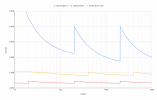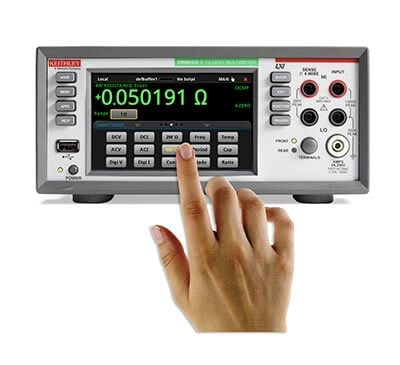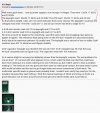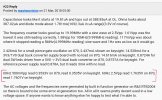-
WANTED: Happy members who like to discuss audio and other topics related to our interest. Desire to learn and share knowledge of science required. There are many reviews of audio hardware and expert members to help answer your questions. Click here to have your audio equipment measured for free!
- Forums
- Audio, Audio, Audio!
- DACs, Streamers, Servers, Players, Audio Interface
- Audio Interfaces (ADC & DAC)
You are using an out of date browser. It may not display this or other websites correctly.
You should upgrade or use an alternative browser.
You should upgrade or use an alternative browser.
cosmos adc, can it measure vrms?
- Thread starter ShiZo
- Start date
staticV3
Master Contributor
- Joined
- Aug 29, 2019
- Messages
- 8,058
- Likes
- 12,935
You can set the Cosmos ADC to one of the eight input sensitivities using the DIP switches at the bottom of the unit, then go into REW's RTA window, click "calibrate level", enter the input sensitivity that the ADC is set to (e.g. "3.5"), and lastly set the unit in the top left corner of the RTA window to Volt.I want to be able to measure how high of a vrms my system is using, will the cosmos work for that?
That way, REW will tell you what the signal strength that's present at the ADC's inputs is in Vrms.
One problem: The Cosmos ADC's input sensitivities are not exact. For example, the 1.7Vrms input on my Cosmos ADC is more like 1.811Vrms.
Therefore, if you want precise Vrms readings, you should instead use a multimeter like the Aneng AN870 with a 50/60Hz 0dBFS test tone.
Its measurement error hovers around ±0.3-0.4% in the relevant voltage range:

Additionally, you can use such a multimeter to calibrate REW so that all readings with the Cosmos ADC will display precise Vrms values.
It changes the Vrms that has to be present on the Cosmos ADC's inputs to reach 0dBFS output signal strength. In other words: gain.Also, I notice voltage is adjustable on the back, what exactly does changing those do?
- Thread Starter
- #3
Thank you. Is there a standard way to run the 0dbfs test tone?You can set the Cosmos ADC to one of the eight input sensitivities using the DIP switches at the bottom of the unit, then go into REW's RTA window, click "calibrate level", enter the input sensitivity that the ADC is set to (e.g. "3.5"), and lastly set the unit in the top left corner of the RTA window to Volt.
That way, REW will tell you what the signal strength that's present at the ADC's inputs is in Vrms.
One problem: The Cosmos ADC's input sensitivities are not exact. For example, the 1.7Vrms input on my Cosmos ADC is more like 1.811Vrms.
Therefore, if you want precise Vrms readings, you should instead use a multimeter like the Aneng AN870 with a 50/60Hz 0dBFS test tone.
Its measurement error hovers around ±0.3-0.4% in the relevant voltage range:
View attachment 210256
Additionally, you can use such a multimeter to calibrate REW so that all readings with the Cosmos ADC will display precise Vrms values.
It changes the Vrms that has to be present on the Cosmos ADC's inputs to reach 0dBFS output signal strength. In other words: gain.
staticV3
Master Contributor
- Joined
- Aug 29, 2019
- Messages
- 8,058
- Likes
- 12,935
Yeah, using a bit-perfect audio player to ensure that no normalization or limiting takes place.
Examples are foobar2000 with the Wasapi exclusive output mode on Windows, or UAPP/Hiby Music on Android
Or you can use the Tone Generator inside REW, in combination with a universal ASIO driver like FlexASIO.
Examples are foobar2000 with the Wasapi exclusive output mode on Windows, or UAPP/Hiby Music on Android
Or you can use the Tone Generator inside REW, in combination with a universal ASIO driver like FlexASIO.
staticV3
Master Contributor
- Joined
- Aug 29, 2019
- Messages
- 8,058
- Likes
- 12,935
that's what I suggested.
Use a multimeter instead of the Cosmos for Vrms readings.
Bonus:
If you're buying a Cosmos anyway for measurements, then you can use the multimeter to calibrate REW for accurate readings with the Cosmos. That way you're not limited to 50/60Hz tones.
Use a multimeter instead of the Cosmos for Vrms readings.
Bonus:
If you're buying a Cosmos anyway for measurements, then you can use the multimeter to calibrate REW for accurate readings with the Cosmos. That way you're not limited to 50/60Hz tones.
You will need a true RMS voltmeter to measure the input voltage at the ADC. You can’t measure only the output voltage at the DAC, because then you measure the open loop voltage of the DAC and not the voltage under load with the ADC. To calibrate the ADC to ADC sensitivity, for every input range you have to apply a sinus signal of 1kHz close to 0dB full-scale (Signal level that the ADC will not clip) and measure the voltage at the input of the ADC Just keep in mind the low input impedance of the ADC if you want to use it as a RMS Voltmeter. To measure higher voltages with the Cosmos ADC, you can use a voltage divider. Then you have to measure the input of the voltage divider (with the connected ADC) and give that voltage for calibration. A bit-perfect audio player isn’t required for calibration; you can use any 1 kHz signal source with low distortion. The accuracy of your voltmeter will finally give you the accuracy of your calibration. If a true RMS voltmeter is not available, the calibration could be also done with a 50 Hz signal and standard voltmeter, but lower accuracy.
The voltage at the ADC has to be measured between Pin 2 and Pin 3 of the XLR connector.
You may measure higher THD of your devices too because of the low input impedance of the Cosmos ADC.
The voltage at the ADC has to be measured between Pin 2 and Pin 3 of the XLR connector.
You may measure higher THD of your devices too because of the low input impedance of the Cosmos ADC.
Last edited:
staticV3
Master Contributor
- Joined
- Aug 29, 2019
- Messages
- 8,058
- Likes
- 12,935
There is none.@staticV3, can you please tell me any reason why a bit-perfect audio player should be used for a voltage calibration of an ADC from the side of an electronic engineer?
OP asked for a standard way of running the 0dBFS tone for measuring a DAC's output.
If you try to play that tone using Wasapi shared or some normal audio player for Android like foobar2000, then you will find that the DAC outputs significantly lower voltage than expected, due to the OS applying a limiter.
To make sure that you're measuring the actual voltage capabilities of your DUT, make sure to play that test tone using software which bypasses the default audio pipeline and sends the tone bit-by-bit.
True.The Cosmos ADC's input sensitivities are not exact. For example, the 1.7Vrms input on my Cosmos ADC is more like 1.811Vrms.
On top of this, the Cosmos ADC has a quite low input impedance, decreasing with the range.
To measure a value, you try to limit the impact of your measurement on the value (there is always an impact, but you try to have it as little as possible).
That's why, typical Digital Multi Meter have input impedance in 1M Ohm range, and Amir's Audio Precision analyzer is around 200k Ohm.
The Cosmos ADC is rather in hundreds of Ohm.
I don’t think any affordable voltmeter would be more accurate than 0.1 volts anyway tbh.You can set the Cosmos ADC to one of the eight input sensitivities using the DIP switches at the bottom of the unit, then go into REW's RTA window, click "calibrate level", enter the input sensitivity that the ADC is set to (e.g. "3.5"), and lastly set the unit in the top left corner of the RTA window to Volt.
That way, REW will tell you what the signal strength that's present at the ADC's inputs is in Vrms.
One problem: The Cosmos ADC's input sensitivities are not exact. For example, the 1.7Vrms input on my Cosmos ADC is more like 1.811Vrms.
Therefore, if you want precise Vrms readings, you should instead use a multimeter like the Aneng AN870 with a 50/60Hz 0dBFS test tone.
Its measurement error hovers around ±0.3-0.4% in the relevant voltage range:
View attachment 210256
Additionally, you can use such a multimeter to calibrate REW so that all readings with the Cosmos ADC will display precise Vrms values.
It changes the Vrms that has to be present on the Cosmos ADC's inputs to reach 0dBFS output signal strength. In other words: gain.
In general measuring voltage should be almost always comparative in audio. Never use absolute numbers and just compare A to B.
Well, I do measure voltage with this:


Keithley DMM6500 6.5 Digit Multimeter with Graphical Touchscreen
The DMM6500 6.5 digit multimeter is a touchscreen bench/system with more measurement functionality and best-in-class measurement insight. Order today!
www.tek.com
staticV3
Master Contributor
- Joined
- Aug 29, 2019
- Messages
- 8,058
- Likes
- 12,935
In post #16 of this thread, a customer compared voltage readings of his AN870 to a Keysight U1252:I don’t think any affordable voltmeter would be more accurate than 0.1 volts anyway tbh.

Seems accurate enough for me tbh.
Edit: AC voltages are compared a few posts down

@staticV3, l dont agree, you can make a voltage calibration of the ADC with any low distortion sine source and not with a DAC only. When l measure the input voltage of the ADC l use HP 34401a with a basic accuracy of 0.06% AC. The resulution of REW for voltage indication is to slow with only two digits
Maybe we misunderstand, from my side of few the Cosmos ADC is for general purpose measuring in audio bandwith and not only for measuring DACs. As Ivan always says, Cosmos ADC will outperform AP 555x, but maybe only for one measurement. THD cant be measured correctly without the right now not available APU due to the too low input impedance of Cosmos ADC. Whats about measuring of levels different to 0.5 dB FS where Cosmos ADC is calibrated. Means measuring at other levels will give invalid measuring results. Ivan always tels THD compensation has to be corrected to level. So how to make correct THD vs level measuring with Cosmos ADC. Sorry. maybe again l am talking here at the wrong place in the forum
there is a temerature dependency of THD measuring with Cosmos ADC too and not all users have the thermostat board installed at their Cosmos ADC. I really dont know why the calibration is done at 27°C environmental temperature, because most users will not have that temperature in their room
it's way easier to heat things up then to cool them down...there is a temerature dependency of THD measuring with Cosmos ADC too and not all users have the thermostat board installed at their Cosmos ADC. I really dont know why the calibration is done at 27°C environmental temperature, because most users will not have that temperature in their room
Also defiantly the wrong thread for this start a new one if you have problems with your ADC.
You would be surprised how wrong you are abut this.I don’t think any affordable voltmeter would be more accurate than 0.1 volts anyway tbh.
Similar threads
- Replies
- 3
- Views
- 1K
- Replies
- 8
- Views
- 1K
- Replies
- 26
- Views
- 2K
